MISERY (1990)
After a famous author is rescued from a car crash by a fan of his novels, he comes to realise the care he's receiving is only the beginning of a nightmare of captivity and abuse.
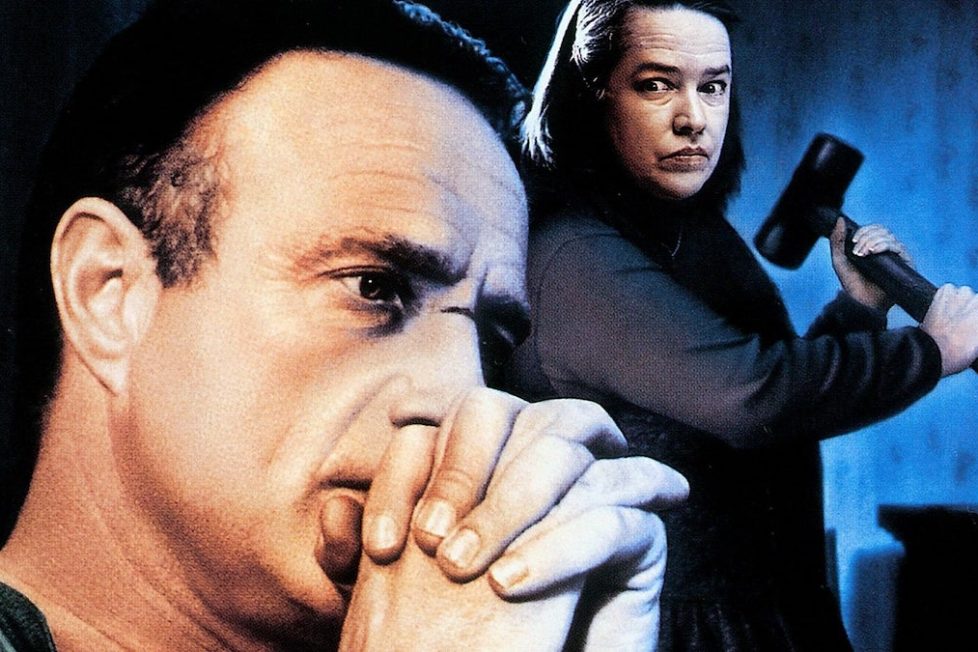
After a famous author is rescued from a car crash by a fan of his novels, he comes to realise the care he's receiving is only the beginning of a nightmare of captivity and abuse.


The best Stephen King adaptations are usually the simpler ones; those based on a single strong idea rather than a multi-stranded plot (i.e. Carrie or Stand By Me, not It or The Dead Zone). Misery by director Rob Reiner and screenwriter William Goldman is among the most successful of them al, thanks to the clarity of its central concept: an injured writer is trapped in a remote house with a crazy woman who believes in his fictional characters a bit too much. It could almost be an elevator pitch.
But, of course, such a stripped-back plot puts an extra burden on the actors. If we don’t believe in them, the whole thing fails because there are no narrative bells and whistles to distract us. And there aren’t many big surprises in Misery, although there are plenty of small ones. This scarcely matters, however, given the power of the central performances by Kathy Bates and James Caan; the latter in a less obviously flamboyant role than Bates but one that contributes every bit as much to Misery’s success.
Misery opens, in fact, with Paul Sheldon (Cann) typing away. The camera shows us a bottle of champagne and an empty glass sitting near him. He handwrites ‘THE END’ on his typescript, pours a drink, and lights a cigarette. It’s clearly an end-of-writing ritual, and one presented with the extreme economy and pellucidity that characterises the whole film, each shot showing a single thing.
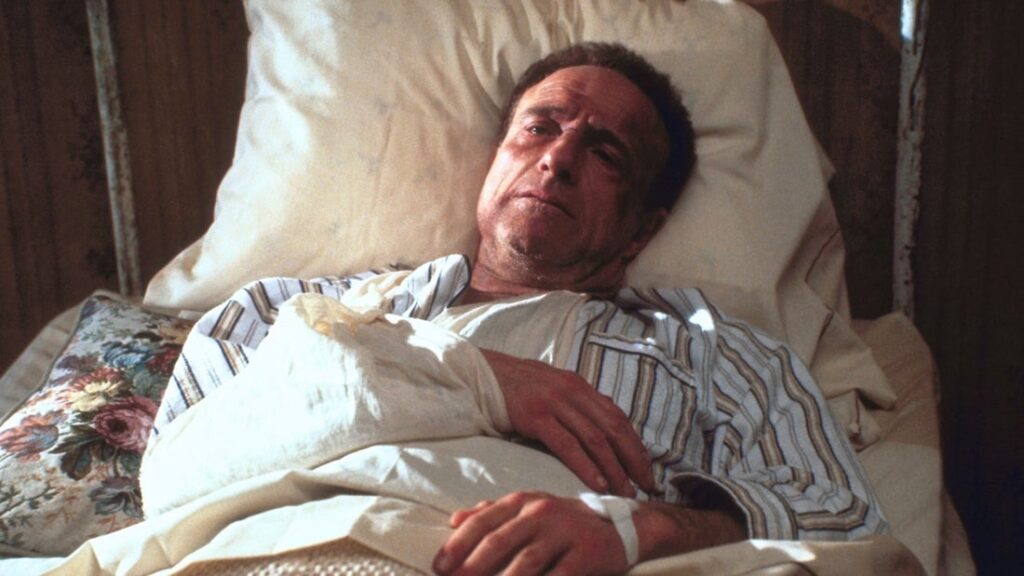
We’ve learned from this that Paul’s a writer and he’s celebrating the completion of a new book. We soon also learn that he’s been staying at a hotel in the middle of nowhere to accomplish it, and we see him driving off, heading back to the big city… but also into a steadily worsening storm. This is a blatant weather metaphor if ever there was one, but it’s a crucial plot element on a literal level, too, because it’s this storm that’ll cause Paul to crash and need rescuing from his wrecked car by Annie Wilkes (Kathy Bates).
Annie, a former nurse, takes Paul to her isolated home and cares for him. She seems solicitous and efficient enough, at first, but Paul soon discovers that she’s more than an average Good Samaritan; she’s a big fan of his Misery Chastain novels, a series of bodice-ripping Victorian romances. She’s his self-proclaimed “number one fan”, so besotted by the character Paul created that she’s even named her pet pig Misery. We hear her speak the famous line “I’m your number one fan” before we ever see her face.
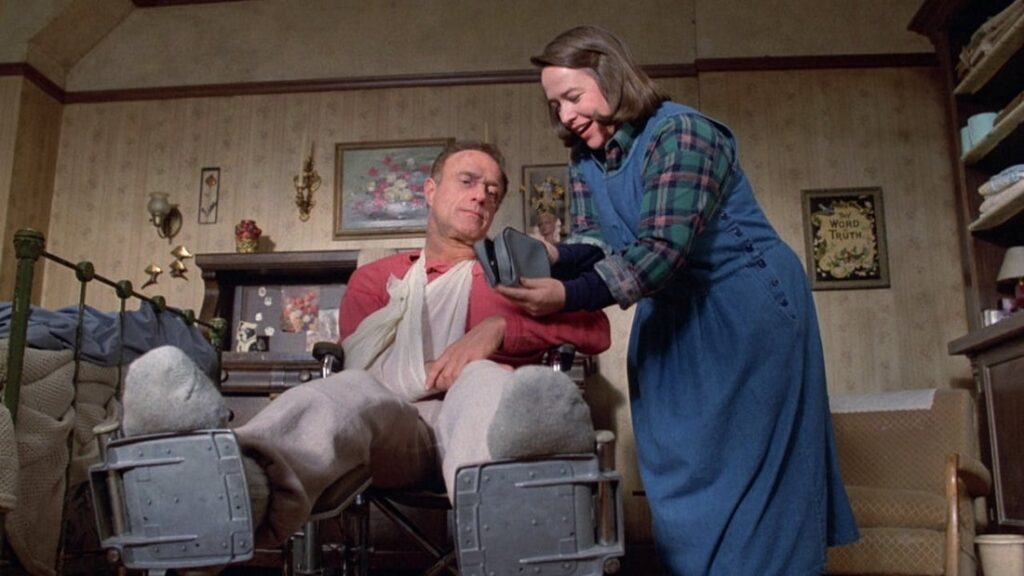
She isn’t so pleased to discover among Paul’s possessions the manuscript he’s just finished, for a much grittier and more foul-mouthed novel set in the modern world. And then something happens to tip her over the edge: his newly-published Misery book arrives at the local store, and Annie settles down to read it with delighted expectations, only to find out that Paul kills off her beloved heroine. Hell hath no fury like a number-one fan spurned, and Paul is now at her mercy, so she decides it’s time for him to start writing what she wants…
Thanks to Bates’s performance, Annie’s the focus of attention whenever she enters the one room—Paul’s bedroom—where much of the film is set. The character’s reputation may be rather OTT but, in fact, it’s a performance of great subtlety. Annie is clearly seriously unbalanced, but she’s also cunning and rage coexists in her with a kind of genuine love. Bates cycles through her moods (coquettish, matter-of-fact, irritated, crazed) without letting any one of them become a caricature, and the way she slowly elevates Annie from calmness, through normal anger, into a different kind of uncontrolled anger is masterful. Changes in her voice and eyes signalling the moment when reason departs.
Goldman, Reiner and, of course, Stephen King should take much of the credit for the character. Annie’s strangely folksy language (“you dirty bird”, “oogy”, “cock-a-doodie”) and her pockets of ignorance (“what’s the ceiling that dago painted?”, referring to the Sistine Chapel) do much to give her a memorable realism, and the way that she absent-mindedly (or perhaps not…) sprinkles fuel over Paul’s bedclothes in one scene is chilling.
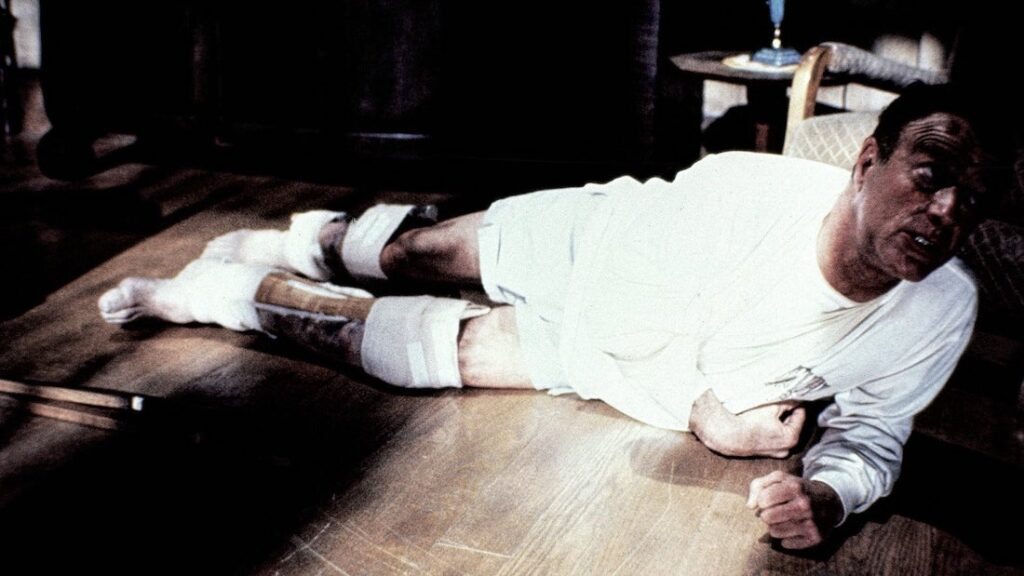
So Bates delivers the performance most viewers will remember from Misery, but Caan does sterling understated in a difficult reactive part that requires him to be bedridden much of the time. He’s completely believable as a popular but frustrated writer; one who wants to be known for more serious literature. He’s an unpretentious professional who’s accustomed to dealing with fans but not used to facing a fan this intense. And as in so much of King’s work, there are plenty of meta points made in Misery about the nature of fiction writing and the author-reader relationship. Paul’s pretended affability toward Annie is coloured with just the right degree of apprehension and, like Bates, Caan does much with simple facial expressions: his eyes wide with worry when she spills some soup, his gulp when she says “I love you, Paul.”
Excellent support is added by Richard Farnsworth as the local sheriff (more important in the film than in the novel), and Frances Sternhagen as his wife, whose search for Paul provides a tension-raising counterpoint to the situation unfolding within Annie’s house. In some films this might detract from the claustrophobia of the house, but in Reiner’s and Goldman’s hands it does the opposite, heightening our identification with the trapped Paul. S Salvation is tantalisingly close, but just out of reach.
Their parallel story also gives Goldman and Reiner an opportunity to inject some humour, which might have been incongruous in the Annie-Paul relationship. (Although it’s not entirely lacking there, either, as when Paul taps out “fuckfuckfuckfuckfuck” on a typewriter Annie’s given him, it’s a clear reference to Jack Nicholson’s insane repetitive typing in The Shining). Lauren Bacall, meanwhile, contributes a nice, if unchallenging, cameo as Paul’s agent.
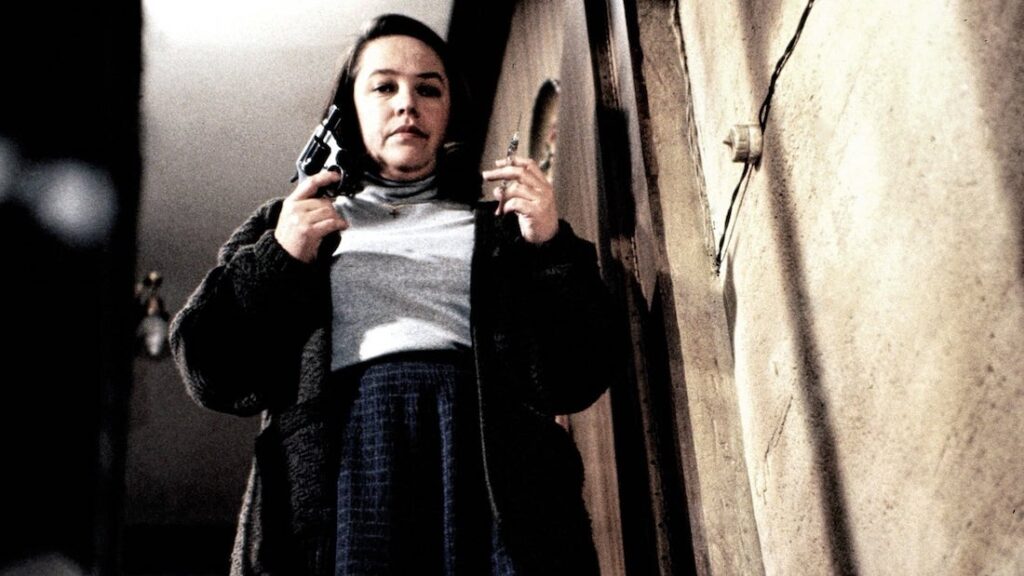
For the most part, precise and uncomplicated direction from Reiner (who had already done so well adapting King for 1986’s Stand By Me) and the expectedly masterful script from Goldman (one of the great screenwriters of modern Hollywood) mix the raw materials of plot and performance into a film that’s gripping from beginning to end. Indeed, perhaps the only weak notes in Misery is Mark Shaiman’s score (which can become rather excessive at big moments) and the mildly unsatisfying ending. A coda of some kind is certainly necessary, yet this one fails to convince us that Paul has been either strengthened or damaged by his experience at the hands of Annie.
Those are not significant drawbacks, thankfully, and Misery was rightly greeted by most critics at the time as workmanlike and enjoyable, if relatively undemanding. As Derek Malcolm wrote in The Guardian, “you’d have to be churlish not to be entertained”. Many singled out Bates’s performance and she won the ‘Best Actress’ Academy Award for it, as well as several other major prizes.
Misery hasn’t dated and remains one of the best Stephen King film adaptations. It’s a showcase, too, for Caan’s capability in a role somewhat unusual for him (Paul is a passive victim most of the time). But above all this is Bates’s film, and while the work of Reiner and Goldman also did much to build her memorable character, it’s the scowling face of Kathy Bates as Annie Wilkes, about to perpetrate some monstrous sadism as a “number one fan”, that has become the enduring memory of Misery.
USA | 1990 | 107 MINUTES | 1.85:1 | COLOUR | ENGLISH


director: Rob Reiner.
writer: William Goldman (based on the novel by Stephen King).
starring: James Caan, Kathy Bates, Richard Farnsworth, Frances Sternhagen, Lauren Bacall, Graham Jarvis & J.T Walsh.
